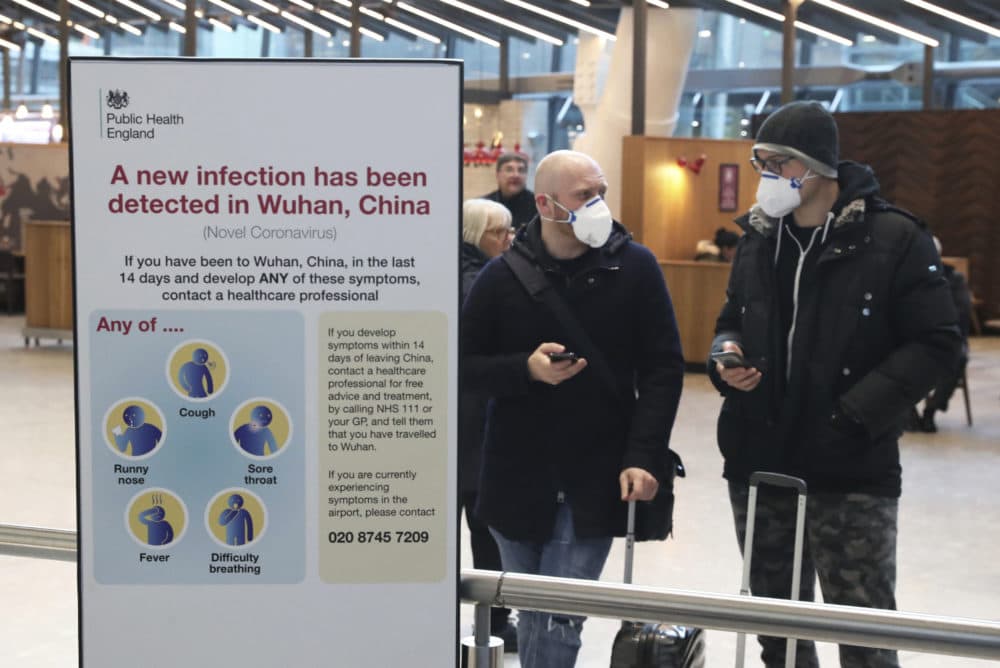Advertisement
It's Time To Stop Trying To Contain Coronavirus, Public Health Expert Says

Fighting an epidemic often comes in stages. In the very beginning, the strategy is containment, says Dr. Shira Doron, an infectious disease physician and hospital epidemiologist at Tufts Medical Center. After that, the name of the game becomes mitigation.
“In the early stage of an outbreak like this, you try containment. You’re trying to keep the virus out of the country or out of new states,” Doron says. “When the measures fail, then you want to shift to mitigation.”
Massachusetts now has 41 reported cases of the new coronavirus. The origins of five of those cases have not yet been identified by the Department of Public Health, meaning they are not linked to any foreign travel or contact with a person known to have the virus.
“I think we are likely to hear over the next couple days that we are seeing what’s called community transmission,” she says. “That’s when people test positive that don’t have any known travel risk or known contacts of covered cases. Once you’re seeing that, then you’re entering the mitigation phase.”
WBUR spoke with Doron about containment and mitigation strategies. This interview has been edited for length and clarity.
Interview Highlights
What kinds of things go into the containment strategy?
You’re trying to detect every case and do contact tracing for anyone who might have been exposed and keep them home. So that’s what you’ve been seeing until now. These measures are effective for a while, and maybe they delay the arrival of the virus to certain areas – which is helpful. Hospitals and clinics can prepare.
Then, when containment stops working – or when you can no longer trace every case – mitigation starts?
Yeah. Mitigation means you’re trying to minimize the number of people who are sick all at once, because what you don’t want to do is overwhelm the health care system. That’s when you start using something called social distancing. That's the idea of canceling events and not having large meetings. The purpose is to make sure you don’t have large groups of people getting sick all at once. That would be too much of a strain on hospitals.
With mitigation, you might end up with the same number of infected people, but just spread out over a longer period of time so the health system can accommodate them better.
Is that where we are now – this mitigation stage where we start canceling large social gatherings and events?
The last press conference I saw from Massachusetts authorities, we were hearing almost exclusively about patients who either had travel risk or were known contacts of covered cases. Now, I think as we hear about the next few cases, we’re likely to see community spread. So we are entering the mitigation stage.
A lot of businesses, universities and other institutions are canceling events. WBUR is also canceling events through the end of the month. That’s all part of the strategy and not a reaction based on fear?
That’s right. It is part of the strategy. I’ve been speaking to the Department of Public Health, too, and I anticipate they’ll be releasing some guidance soon on this mitigation strategy. I think they’ve been really, really busy there. They’re trying to keep up with all the cases. We might even see a day not too far from now where they stop doing contact tracing and just focus on mitigation. I’d much rather see them shift toward guiding us on how to mitigate the outbreak.
Will quarantining and isolating still play a large role?
At a certain point, keeping people in quarantine might not work anymore. You might be in quarantine for 14 days due to an exposure, and then be exposed again the next day. There’s only so long we can keep people indoors.
So what are the best things individuals can do to help slow the spread of coronavirus at this point?
This is a little bit more toward employers than employees, but even employees can start to say, 'you know what? I’m going to work from home on all the days that I can.' Because the more people that are not congregating together, the less they’re going to be transmitting infection between them.
What about travel? A lot of people have trips planned – is it advisable to cancel those?
I’m less and less worried about travel as the disease spreads more widely throughout the United States and the world. It’s not so much the travel that’s an issue, it’s what you’re traveling to do. If you’re traveling to be part of a large gathering, that’s not in keeping with social distancing in the mitigation phase we’re trying to enter right now. If you’re traveling to sit on a beach by yourself, it’s probably OK.
This segment aired on March 10, 2020.
